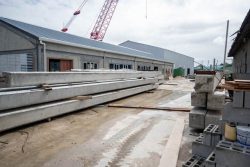With the year coming to a close, President David Granger is still to act on the advice of the Judicial Service Commission (JSC) over appointments to the bench despite the widely held view in the legal community that he has no choice but to act on the advice of the JSC.
The constitution clearly states that when it comes to the appointment of Justices of Appeal and Puisne Judges, the president is duty bound to act on recommendations made by the JSC.
“If the Chancellor advises the President that the state of business of the Court of Appeal or the High Court so requires, the President shall act in accordance with the advice of the Judicial Service Commission and appoint a person to act in the office of Justice of Appeal or Puisne Judge as the case may require”, Article 128 (1) (d) of the Constitution states.
Months have passed since President Granger was given a list of
judicial nominees. The names of four persons, two Court of Appeal judges and two others to replace them were sent by the JSC since May, this newspaper was told.
Nothing much has been said by the government about the failure of the president to act on the judicial nominees.
The matter is dealt with under the heading `Judges of the Supreme Court of
Judicature’. This section of the Constitution explains how the appointment of the Chancellor and Chief Justice are done, the appointment of judges, the appointment of part-time judges, qualification of judges and the attendance of additional judges in the Court of Appeal and High Court.
Noting that the judges, other than the Chancellor and the Chief Justice are appointed by the president, the Constitution states that the president mustact in accordance with the advice of the JSC.
It was stated that such a person once appointed to such an office shall
continue to serve until the appointment is revoked by the President,
“acting in accordance with the advice of the Judicial Service Commission”.
The section states that the president also appoints part time judges in
accordance with the advice of the JSC and that it is the parliament that may “by law determine the terms and conditions of appointment of part-time judges.”
In addition, Article 111 of the Constitution can also be applied.
Article 111 states “In the exercise of his functions under this
Constitution or any other law, the President shall act in accordance with his own deliberate judgement except in cases where, by this Constitution or by any other law, he is required to act in accordance with the advice or on the recommendation of any person or authority”.
In continuing, it states “Where by this Constitution the President is
directed to exercise any function on the advice or recommendation of any person or authority, he may, in accordance with his own deliberate
judgement, once refer any such advice or recommendation back for
reconsideration by the person or authority concerned and if that person or authority, having reconsidered the original advice or recommendation, substitutes therefor a different advice or recommendation, as the case may be, the President shall act in accordance therewith; but save as aforesaid he shall act in accordance with the original advice or recommendation”.
The non-appointment of the judicial nominees was first highlighted by the opposition PPP/C. The Ministry of Presidency has yet to explain the reason for the delay, although State Minister Joseph Harmon has said the President would act with “reasonable speed” on the appointment of judges recommended by the JSC.
It was later revealed that the names were provided to the President seven months ago.
Attorney-General Basil Williams, by way of a letter to the media, had
responded to calls by the PPP/C for the President to act.
In his letter, which was published in the November 18 edition of Stabroek News, Williams had stressed that the President was paying careful attention to his constitutional duty in the appointment of judges and made the point that he was not bound by a timeline.
“Suffice it to say that the constitution does not impose a timeline on the President to treat with any such recommendation by the JSC, and for good reason. The President must have a higher duty to ensure that the judges he appoints are fit and proper, and were selected and recommended after a transparent process,” Williams said.
He also noted that the recommendations were not triggered by any public advertisement of vacancies in the office of judges and inviting applications for appointments thereto. Under the APNU+AFC government, he added, the days of handpicking and secret overtures to fill vacancies in the office of judges are over. “The President would be remiss in his duty to the Guyanese people if he were to robotically appoint judges recommended by the JSC without first ascertaining the qualifications, suitability, experience, expertise, integrity and absence of nepotism, among other considerations,” he added.
Williams, however, did not indicate the President’s intended course of
action.
Senior Counsel Ralph Ramkarran responded to the letter and accused Williams of “shredding the constitution” by stating that the president has discretion in deciding whether to appoint the judges that were recommended.
Ramkarran, in his weekly Conversation Tree column, pointed out that in 2001 the authority of the JSC had been strengthened and the discretion of the President in appointments was removed by the substituting of the word “shall” for “may.”
Ramkarran also made mention of Article 128.
Former Attorney General Anil Nandlall had also added his voice and asserted that Granger had no excuse for the delay and should be acting swiftly on the matter.
Nandlall has since said that unless the nominees are appointed within
reasonable time, he will file a constitutional motion.






